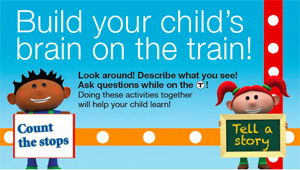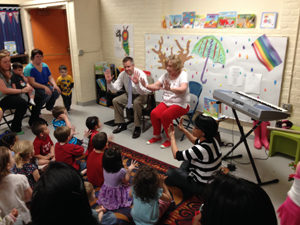The Harvard Family Research Project separated from the Harvard Graduate School of Education to become the Global Family Research Project as of January 1, 2017. It is no longer affiliated with Harvard University.
July 2015
Brain Building in Progress
|
|
 A grandmother helps her grandson identify the pictures in a children's book about transportation, while riding the "T" subway in Boston. |
 BBIP advertisement shown in MBTA subway and bus lines. |
|
 Early Education and Care Commissioner Tom Weber participates in the Clinton Community Partnerships for Children's singing and storytime hour for young children and their families. |
The science is clear: Early nurturing interactions shape the architecture of the brain. Environment and experience in children’s early years affect brain functioning and thus how they learn and develop. But how do you easily communicate the neuroscience research so that everyone in the community takes collective action to strengthen early childhood care and education?
The Massachusetts Department of Early Education and Care and the United Way of Massachusetts Bay and Merrimack Valley figured out a way. They launched “Brain Building in Progress (BBIP),” a statewide public awareness campaign to convey to families and key state stakeholders, especially those outside of the early education community, the importance of investing time and resources in young children.
Messages
Through “Five Ways to Be a Brain Builder,” the campaign’s key messages translate the science of brain development to communicate that everyone can be a “brain builder.” Among the campaign’s primary messages are:
1) “Make Every Moment a Brain Building Moment” to foster positive interactions anywhere, anytime;
2) “Look for Brain Building Zones” to create safe, child-friendly environments;
3) “Build Your Knowledge: The More We Know, the More We’ll Help Children Grow” to increase knowledge of the early childhood education sector;
4) “Make the Connections That Build Young Brains” to engage with families and communities; and
5) “Lead So That Young Children Succeed” to focus on leadership and advocacy.
For Whom?
To pursue the collective action of all stakeholders in Massachusetts, the BBIP campaign focuses on three audience groups:
Direct caregivers: parents, grandparents, and informal childcare providers. The campaign provides information about early childhood brain development and tools for caregivers and families to create brain building moments with children anytime, anywhere.
Service providers: public and nonprofit organizations. The campaign provides one-on-one technical assistance, whole-group trainings, knowledge of brain science, and print informational materials to build the organizations’ capacity to partner with families. Because service providers have direct contact with parents, the campaign relies on them to distribute information about early childhood brain development and to lead brain building workshops in the community. Service providers also receive press release templates and talking points so that they can spread the campaign’s message to legislators and community leaders through brain building events.
Civic groups: legislators, businesses, and community leaders. The campaign engages legislators and community leaders in local brain-building events in order to gain support for critical investments in early childhood care and education. The campaign strives to build partnerships with businesses to increase community awareness about the connection between investing time and resources in young children and the future prosperity of Massachusetts.
And How?
The BBIP campaign employs a variety of strategies to help accomplish its mission:
“I Am a Brain Builder” Parent Workshops
These workshops help parents understand the science of brain development in early childhood and how to carry out practical brain-building activities at home with their children. All participants receive “Brain Building Activity Kits” and activity guides (translated into 10 languages) to use with their families.Brain Building Zones
The BBIP campaign partners with state agencies and local businesses to create Brain Building Zones, which spread the message that learning occurs anywhere, anytime and that everyday can be a “Brain Building Moment.” Three key partnerships have been established through out the state in this effort:Registry of Motor Vehicles (RMV)
Families and children stop by RMV locations across the state to engage in the “License to Learn” program. Children learn about the importance of buckling up, crossing streets safely, and wearing a protective helmet while riding bikes.Stop & Shop
Grocery stores are ideal brain building environments because of the variety of items, colors, shapes, and sizes found on their shelves. In a future partnership with the Stop & Shop chain, grocery stores will create brain building experiences that prompt conversation between children and their caregivers.Massachusetts Bay Transportation Authority (MBTA)
Subway and bus lines showcase “Build your child’s brain on the train” advertisements to prompt parents to create teachable moments nearly everywhere, particularly during public transit rides.Brain Building in Progress Week
The BBIP campaign implements weeklong events and activities for everyone in the community. Service providers, civic groups, and educators are encouraged to staff a booth or a Brain Building Zone during Brain Building in Progress Week so that parents can learn ways to create brain building moments at home.Events Calendar
All the events, workshops, and activities happening in the state can be found in BBIP’s online event calendar.
SNAPSHOT CONTRIBUTOR
As a graduate research assistant at Harvard Family Research Project, Anairis Hinojosa explored statewide family engagement policies and practices. She recently graduated from the education policy and management program at the Harvard Graduate School of Education. Previously she served as an analyst at Goldman Sachs and a second-grade teacher with Teach For America.
|
SEND US YOUR SNAPSHOT! If you’re doing something that you think others should know about, we invite you to send us a description with a photo or short video to fine@gse.harvard.edu with the subject line: SNAPSHOTS. |

